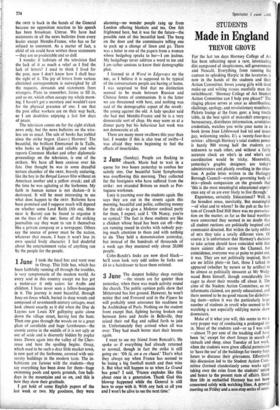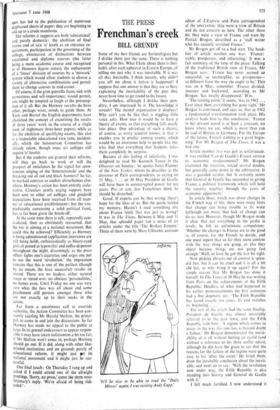Made in England
STUDENTS TREVOR GROVE
For the last ten days Hornsey College of At,. has been subsisting upon a rare, intoxicating diet compound of sleeplessness, self-government and Nescafe. Everything from running the canteen to sploshing Harpic in the lavatories is now in the hands of the students and their Action Committee. Sweet young girls with tired make-up and wilting tresses manfully man the switchboard: 'Hornsey College of Art Student Action Committee can I help you please?' The ringing phrase serves at once as identification, challenge, apology, and revolutionary manifesto.
Pickets lounge at the front gate; a long trestle table, in the best spirit of makeshift emergency bureaucracy, distributes information, scrutinises credentials, watches you write your name in a book (even Joan Littlewood had to) and issues gay, welcoming smiles. It's a twenty-four-hour service: although Hornsey's total student power is barely 900 strong half the students are unknown to each other, and without a fairly accurate check on who's in and who's out coordination would be tricky. Meanwhile, yesterday's graphic designers are today's administrators and plainly revelling in the situa- tion. A polite letter written to the Haringey Borough Council—erstwhile governing body of ace—pleads compassion on the grounds that 'this is the most meaningful educational experi- ence any of us are ever likely to live through.'
Experience, certainly. Educational? Well, in the broadest sense, inevitably. But meaningful —of what and to whom? In the pub at the bot- tom of Crouch End Hill there was no prevarica- tion on the matter; as far as the local worthies were concerned they seemed in no doubt that all student ructions are politically inspired and communist directed. But within the tatty edifice of RCA they take a totally different view. Of course it is unfortunate that Hornsey's decision to take action should have coincided with that more sinister affair across the Channel, but coincidence, everyone was at pains to point out, it was. They are not politically inspired, there are no leftist plots—in fact, those I talked to appeared (whether by nature or by artifice) to be almost as politically innocent as Mr Wedg- wood Bean himself, though considerably less eager to shoot their mouths off about it. The aims of the Student Action Committee, so my informants claimed, are purely educational, and there seemed to be no good reason for disbeliev- ing them—unless it was the particularly large number of students in revolt who seemed to be watching a not especially edifying movie show downstairs.
Make of it what you will, this seems to me a very proper way of conducting a prolonged sit- in. Most of the students and—or so I was told —almost 75 per cent of the teaching staff have been 'in,' except for short forays in search of victuals and sleep, since Tuesday of last week, when the students were given official permission to 'have the use' of the buildings for twenty-four hours to discusss their grievances. Effectively this discussion led to the Student Action Com- mittee (formed clandestinely some weeks ago) taking over the reins from the students' union and hence to the present state of affairs. Since then life in embattled Hornsey has not been concerned solely with watching films. A general meeting on Friday and a non-stop series of semi-
/jars has led to the publication of numerous duplicated sheets of paper; they are beginning to add up to a crude manifesto.
The reforms it suggests are both 'educational' and purely domestic: the abolition of final exams and of GCE 'o' levels as an entrance re- quirement, participation in the governing of the college, elimination of distinctions between vocational and diploma courses (the latter being a more academic course and recognised as of Honours degree status), the replacement of a 'linear' division of courses by a 'network' system which would allow students to choose a variety of alternative combinations and permit them to change courses in mid-career.
Of course, if the grim guerrilla faces, sick with earnestness and self-importance, would permit, one might be tempted to laugh at the presump- tion of it all. But the Hornsey savants do have other, perhaps wiser, minds to guide them. At York and Bristol the English departments have abolished the concept of examining the results of three years' work in the course of a single week of nightmare three-hour papers; while as for the abolition of qualifying exams, this also
is a respectable educational view (one, incident- ally, which the Summerson Committee has already taken, though most art colleges still require 'o' levels).
But if the students are granted their reforms, will they go back to work or will the prospect of anticlimax be the signal for spon- taneous singing of the 'Internationale' and the breaking out of red and black banners? So far, in marked contrast to student disturbances else- where, Hornsey's action has been entirely isola- tionist. Circulars gently urging support have
been sent to other art colleges and goodwill deputations have been received from all man- ner of educational establishments; but the LSE, predictably canvassing a solid political front, has so far been given the brush-off.
At the same time there is talk, repeatedly con- tradicted, then as obstinately reasserted, that the SAC is aiming at a national movement. But could this be achieved? Efficiently as Hornsey is being administered (application interviews are still being held), enthusiastically as bleary-eyed girls sit poised at typewriter and coffee dispenser throughout the night, disarmingly as the press officer lights one's cigarettes and urges one not
to use the word 'revolution,' the impression remains that this is one of the politest (though by no means the least successful) revolts on record. There are no leaders, either natural
rouge or tinted noir, no obvious 'personalities,' no names even. Until Friday no one was very sure what the fuss was all about and some puzzlement still persists amongst those who are not exactly up to their necks in the action.
Far from a unanimous call to override authority, the Action Committee has been con- stantly cajoling Mr Harold Shelton, the princi- pal, to come in and join the discussions. So far Hornsey has made no appeal to the public at large. In its genteel endeavours to appear respon- sible it may have taken isolationism a bit too far; if Mr Shelton won't come in, perhaps Hornsey should go out. If it did, along with other like- minded institutions and on grounds purely of
educational reform, it might just get its national movement and it might just be suc- cessful.
One final touch: On Thursday I rang up and asked if I could attend one of the all-night
meetings. 'Sorry, no press,' came the stern revo- lutionary's reply. 'We're afraid of being ridi- culed.'s







































 Previous page
Previous page